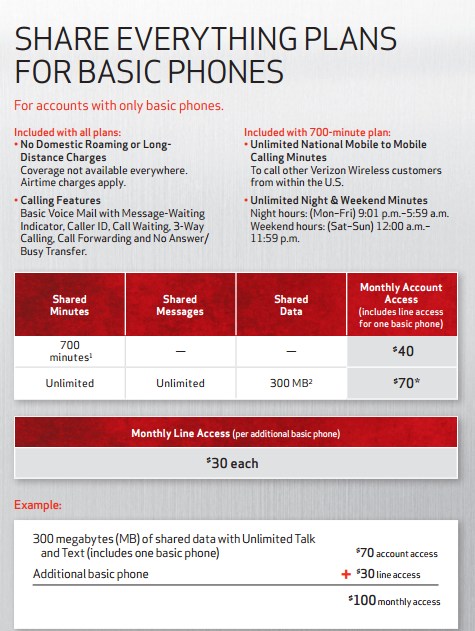 If you don’t believe Verizon Wireless’ newest family-share plans work for you, you are not alone.
If you don’t believe Verizon Wireless’ newest family-share plans work for you, you are not alone.
More than a few Verizon Wireless customers are in open revolt on the company’s interactive forum, and some are preparing to leave a wireless company they have stayed with for up to 15 years. In a word, the consensus from these vocal customers is: “enough.”
Customer ‘bgudgel‘ explains why:
I have been a loyal Verizon customer for seven years now. I have defended them and recommended them to friends and family, but I feel my time as a Verizon customer has come to an end. The simple reason is that Verizon no longer sees me as a valued customer. I am just a source of income to them. I was prepared to swallow the $30 upgrade fee, but the new shared data plans are the final straw.
You can argue pricing and details all you want, but the simple fact is this – Verizon is clearly not interested in providing great service at fair prices to their customers anymore. The want to provide great service at the highest possible price, and they are taking pages out of the Big Cable handbook to do it – requiring services you don’t want/need in order to get the service that you actually do. And on top of that, the price levels they have chosen for data thresholds and adding additional lines are completely indefensible.
Verizon, I have heard your message loud and clear. You no longer care about me as a customer, so I will gladly take my business somewhere else. I do not know if I can get a better deal anywhere else, but I will no longer give money to you based on the simple principle that you have no respect for your loyal customers. It feels like you are just using us, and that is when I say goodbye.
A California customer considers this the last straw for Big Red:
I too have been a Verizon customer for years. But this final slap in the face is it for me. First, the stupid $30 “upgrade” fee for the “privilege” of buying a new phone from Verizon, and now this absurdity.
I am researching other companies’ prepaid plans now, and I fully intend to be gone within a couple of weeks, at most. And I won’t encounter cancellation penalties as our 3-line plan is more than 2 years old.
I have grown weary of “data” and its rising costs and caps, and will purposely look for a voice/text plan only. Enough.
And Lyondellic tallies up Verizon’s nickle-and-diming customers over the past year:
During my year with Verizon, I have seen a failed attempt to impose a $2 ‘convenience’ fee for paying my bill online. I have also seen a $30 fee added for device upgrades. Then there was the February 2012 change in the customer agreement that does not limit so-called ‘Network Optimization’ to 3G devices, which also allows throttling (let’s call it what it is) during the current and NEXT billing cycles. Verizon seems to have no issues with someone getting full 4G LTE speed, as long as they pay for it by the GB, but apparently feel that those of us with unlimited data plans should be considered data hogs that can be slowed down into billing cycle that has not even started. So network optimization in Verizon-speak means freeing up bandwidth for their pay by the GB customers by throttling customers with grandfathered unlimited data plans that are using their devices in a manner that is consistent with their agreements! Finally, we are told about the cries for family shared-data plans. I figured Verizon might do something that would make it attractive for me to move into a tiered data plan, boy was I ever wrong.
Now Verizon wants to charge $40 per smartphone to actually use the shared-data plans! So, for someone who is paying ~$87 per month for a smartphone with unlimited data, the cost per month will now be somewhere around $120 for the 6GB plan! How are these plans a good thing for either new or existing customers?!? I was considering paying full price to upgrade to a Galaxy Nexus in order to keep my unlimited data plan, but I have changed my mind. I can order the Galaxy Nexus from Google for $399 and use a prepaid, no-contract plan from T-Mobile plan that provides me with 100 minutes, unlimited text messaging and 5GB of data at 4G speeds for $30 month. Since I do not make a lot of calls on my phone, why would I want to continue to pay Verizon $87 per month without subsidized device upgrades, which would move me into a $120 month plan?
So I look at this as a simple lesson in economics. I can pay the ETF, buy a GNex and still come out ahead by moving to T-Mobile. The beauty of this is that I will also be taking money away from Verizon, as they clearly want to treat me like a second-class customer that needs to fork over more of my money. So I will vote with my dollars and send a clear message to Verizon that their conduct is unacceptable. I encourage others here to consider doing the same. Your speed may not be blazing fast with T-Mobile, but neither will be the speed that money flies out of your wallet or purse. My .02 cents!


 Subscribe
Subscribe





